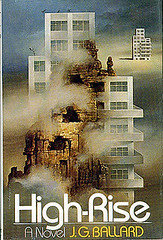
High Rise (1975) by JG Ballard
High Rise was the third of Ballard's "urban" novels from the 1970's (the others being Crash and Concrete Island). It begins with the killer first sentence:
'Later, as he sat on his balcony eating the dog, Dr Robert Laing reflected on the unusual events that had taken place within this huge apartment building during the previous three months'
The huge apartment is the first of five massive buildings to be occupied in a development. The 1000 suites rise 40 stories in the center of a vast parking lot. After the final apartment is occupied, the Ballardian strangeness begins. Slowly, small things begin to go wrong with the services that allow many of the residents t exist solely within the building. The degeneration of the apartment is mirrored by the residents behavior. Surly and unruly, the tenants begin to segregate themselves into a class structure rougly corresponding to floor elevation. Fewer and fewer of them bother to go to work, trash piles in the starwells and halls, armed camps commandeer elevators for their private use.
Ballard disdain is obvious; they have the 'orthodoxy of the intelligent... a well-to-do and well-educated proletariat of the future boxed up in these expensive apartments with their elegant furniture and intelligent sensibilities, and no possibility of escape.' The novel tracks three characters, one from each of the class levels, upper, middle and lower through their descent from upstanding citizen to savage barbarian of the high rise.
This was a fun book to read. 30 years on many of his observations about modern urban society still ring true, however, there seems to be a certain ingenuousness about his approach. Humans have become increasingly crowded together and, for the most part, we still seem to be holding it together. (Although I wonder what Ballard migh make of the class/race riots in the French suburbs? Prophetic?)


1 comment:
I'm psyched to read this! That is a kickass first sentence.
Post a Comment